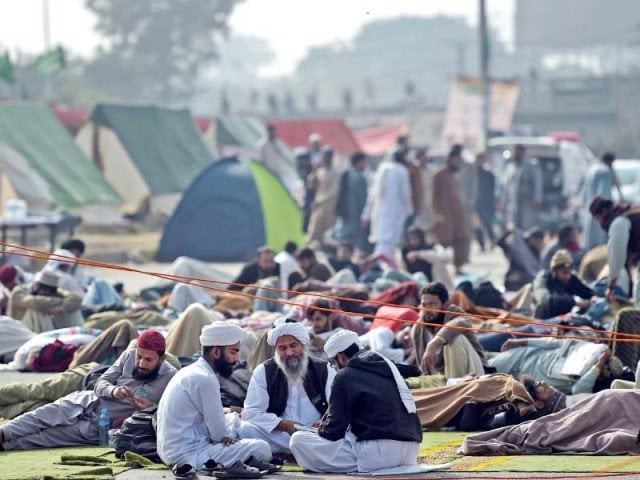Let’s not open the floodgates
ECP should make sure that all marginalised groups can participate in electoral process freely

Protesters are camped at Faizabad. PHOTO: EXPRESS/FILE
In case this person does not sign the prescribed declaration, or does not turn up before the officer in charge, he/she would be deemed to be a non-Muslim and his/her name would be deleted from the joint electoral rolls and would be added instead to a supplementary list of voters in the same electoral area as a non-Muslim. The government claims the amendment was made to restore the declaration for voters regarding Khatm-i-Nabuwwat. The objective was to keep the status of the Ahmadiyya community as non-Muslims intact. Ahmadi voters are added in a separate voter list for non-Muslims.
In the religiously charged atmosphere there was hardly any room to lawmakers to have a thorough debate on the bill. Some lawmakers, particularly from the opposition, raised meek but valid questions over the manner in which this law was adopted by parliament.
Leader of the Opposition in the Senate Chaudhry Aitzaz Ahsan has questioned the timing of the law. It seems to have been passed under duress. True. Parliament has adopted it at a time when protesters belonging to some religious groups were staging a sit-in at a key artery connecting Islamabad with Rawalpindi. By blocking the road they have crippled the flow of traffic between the twin cities, despite the Islamabad High Court’s order to vacate the road. The court had previously proposed that such rallies should be held only at the designated Parade Ground protest site. Adopting the law at this point of time does send out the wrong message. Pressure groups are thereby encouraged to hold sit-ins in the federal capital, pressurise parliament and get it to enact laws of their own choice.
Another objection raised against the move is the omission of the time-limit for complaints about a voter. Previously, objections about the faith of a voter could be raised within 10 days of the finalisation of electoral rolls. Objections can now be filed at any given time. This opens the way to the misuse of the law. In case hundreds of people do file objections, it would spark chaos. Moreover, the new law does not have any safeguards to discourage false accusers. Unfortunately, we have a history of misusing the law especially the religiously motivated ones. The laws on blasphemy are prime examples. In order to promote true democratic culture, we need to focus on democratic values where our representatives should be judged more by their competency as lawmakers and by their moral and financial integrity than their religious outlook.
There are several observations by the superior judiciary asking parliament to elucidate vague religious clauses inculcated during General Ziaul Haq’s era in Articles 62 and 63 of the Constitution related to qualification and disqualification of a candidate to run in elections. And with national elections due next year, it is time the election authorities devise a mechanism for tangible scrutiny of candidates by going through their financial records before accepting their nomination papers. Similarly, the ECP should make sure that all marginalised groups, including women and religious minorities, can participate in the electoral process freely.
Published in The Express Tribune, November 20th, 2017.
Like Opinion & Editorial on Facebook, follow @ETOpEd on Twitter to receive all updates on all our daily pieces.














COMMENTS
Comments are moderated and generally will be posted if they are on-topic and not abusive.
For more information, please see our Comments FAQ